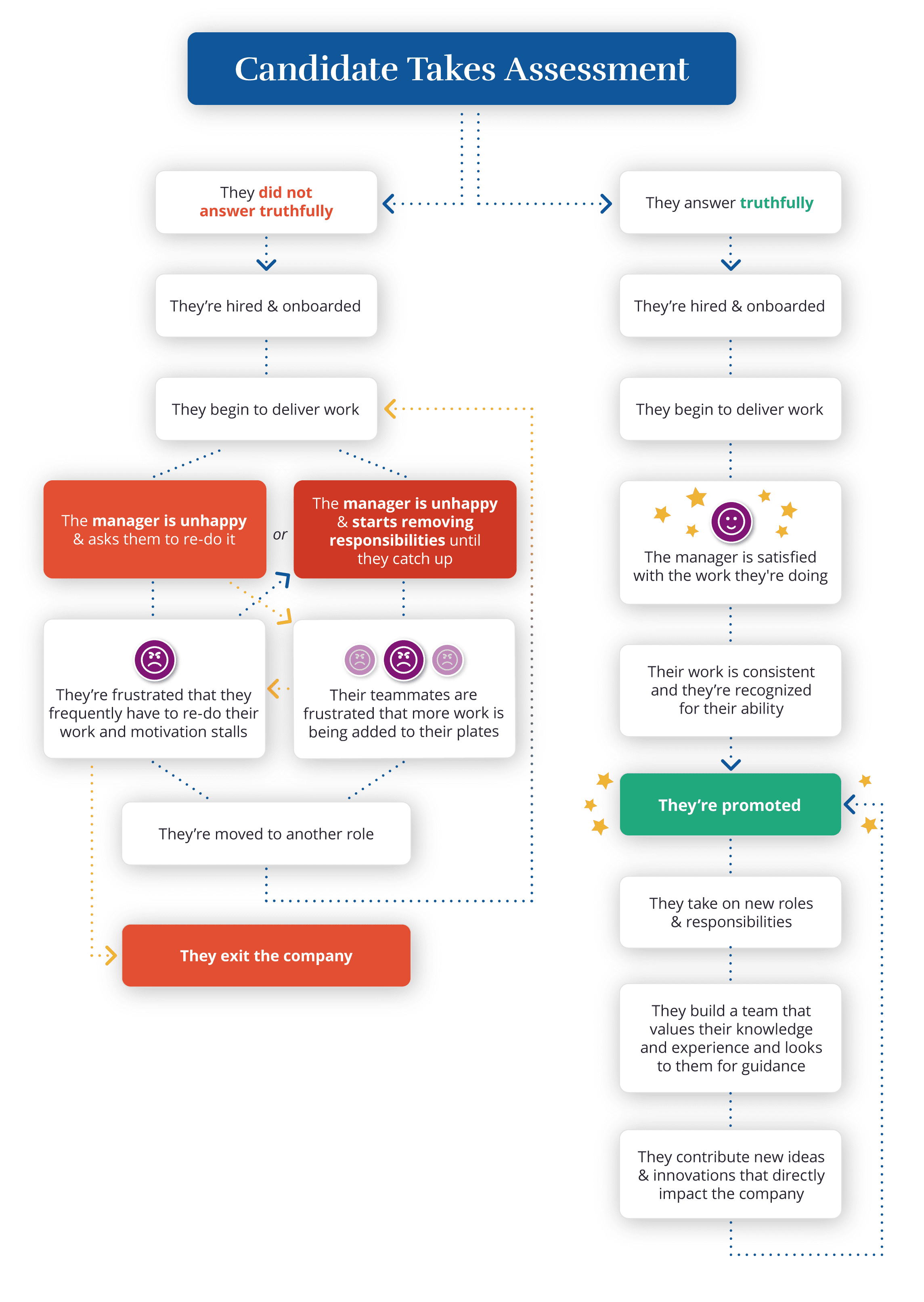Personality assessments are a key component of the interview process. Assessments provide objective criteria about a candidate’s personality traits and motivations, allowing for an unbiased view of how well a candidate will fit a specific role.
For almost 60 years, the Caliper Profile has helped companies predict a candidate’s potential for success in a particular job regardless of the candidate’s gender, ethnicity, age, or other factors that may bias a hiring decision. And when measured against a validated job model, the assessment data can predict how the individual will respond when faced with challenges at work and how successful the individual will be in the role. Assessments help to minimize unconscious bias by providing objective data to use when evaluating a candidate.
Are your candidates too worried about 'passing' your #PersonalityAssessments? @CaliperCorp says honesty is the best policy and shows you what happens when you try and guess what the hiring manager wants: Click To TweetAssessments are a valuable tool, and while they shouldn’t be taken lightly, it’s important for your candidates to understand that they’re nothing to panic over. Often considered a tool for the employer, assessments are actually a valuable part of the process for the candidate, too. When both sides of the table approach the assessment with the same goal — a successful hire and a good culture fit — everyone wins. Some candidates may believe that trying to “pass” the assessment will help them land the job. But there is no pass/fail in assessing personalities, and trying to game the system doesn’t benefit either party involved. Here’s how candidates and employers should each approach personality assessments so that new hires don’t end up in a job where they can’t thrive:
The Employer Approach
With Caliper’s 52 validated job models, there’s a job for everyone. When interviewing candidates for a specific role, it’s important to review their assessment as it compares to the responsibilities and expectations for the role. Review the specific traits, behaviors, and competencies required of the job against those exhibited in the candidate’s results, so that you understand their strengths and areas for development before stepping into the room with them. Does the candidate have the key ingredients needed for success?
As you bring your interview questions into focus, don’t just consider the specific task-based needs for the job. Also ask targeted, behavioral-based questions that can isolate key personality attributes and explore how the individual may have developed other skills in order to adapt to inherent weaknesses. Listen to the candidate’s responses and compare them to the results of the Caliper Profile. Candidates who tried to answer based on what they think hiring managers want to hear, rather than their actual answers, will show themselves immediately. Inconsistencies in the assessment indicate someone who might not be the right fit for this role.
The Candidate Approach
Honesty is the best policy. No one wants to be stuck in a job they don’t want or enjoy. Workplace personality assessments are just as much for the candidate to understand how they fit into a role as it is for the employer. Before administering your assessment, it’s good practice to make it clear to your candidates that this isn’t something they need to go into with worry, that it’s in their best interest to be open and honest. And it’s also just one added data point in the hiring process.
For candidates to be fully transparent and honest is just as important for their own career goals as it is for your hiring needs. Attempting to answer the assessment by trying to fit themselves into a mold they believe exists for the role will likely mean they’re placed into a role that isn’t right for them. They could then have trouble getting up to speed, advancing through the company, and even enjoying their work. Candidates who answer to the role, as opposed to themselves, will wind up leaving the company after a short stint, back on the job market, or they’ll be stuck in a frustrating position with no exit strategy.

The candidate in the flow chart who approached the assessment with honesty experiences higher job satisfaction, excels in their role and professional development, is upwardly mobile within the company, and reaches benchmarks in their career goals in a timely fashion. The employer enjoys high productivity, efficiency, and loyalty from the employee. Conversely, the candidate who answered according to how they perceived the hiring manager wanted them to, experiences stagnation, displacement, dissatisfaction, and ultimately exits the company. The employer experiences lost productivity and will lose money searching for a replacement. When you communicate clearly to candidates that personality assessments are just as much a tool for themselves as it is a tool for the hiring manager, everyone benefits in both the long and short term.
To learn more about how the Caliper Profile can improve your hiring process, reach out to our experts today to get started!

